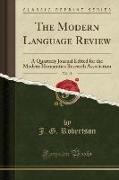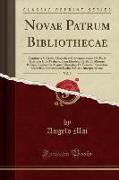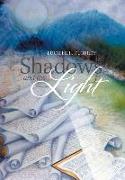- Start
- The Modern Language Review, Vol. 18
The Modern Language Review, Vol. 18
Angebote / Angebote:
Excerpt from The Modern Language Review, Vol. 18: A Quarterly Journal Edited for the Modern Humanities Research Association
Volume XVIII January, 1923 Number 1 Some Fourteenth Century Borrowings From Ancren Riwle The Chastising of Gods Children is a well-known Middle English theological treatise addressed to a nun, which was printed by Caxton and exists in various manuscripts (Brit. Mus. Harl. Ms.6615, Trin. Coll. Camb. Ms.305, Magdal. Coll. Camb. Pepysian Ms.2125, etc.). It was early brought to notice because of its reference to the use of the Scriptures in English, and Miss Margaret Deanesly, in quoting the section in question 1, points out that the work is cited in the Clensing of Mans Soul, of which a copy belonged in 1401 to an abbess of Barking 2. The Chastising therefore was written before that date. She also points out that it was bequeathed to the Carthusians of Shene by the first recluse there about1415: she lists two later legacies in which it occurs 3. It was therefore apparently a work of some popularity in its time. It has escaped notice that the Chastising of Gods Children takes its theme and title from a section of the Ancren Riwle. This it incorporates in the first chapter, with no sign that it is quoting. With the Ancren Riwle should be compared the Caxton edition of the Chastising as follows: Ancren Riwle: Chastising, Ure Louerd, hwon he iSoleS et we Also, whan our lord suffreth vs be beoff itented, he plaie Smid us, ase pe tempted in our beginnynge, he playeth moder mid hire 3 unge deorlinge, vlihft wyth vs as the moder wyth the chylde, from him, and hut hire, and let hit sitten whiche somtyme fleeth away and hideth one, and loken 3 eorne abuten, and cleoher, and suffreth the chylde to wepe and pien, Dame! dame! and weopen one crye, and besely to seke hir wyth sobhwule, and Jeonne mid ispredde ermes byng and wepyng, but thenne cometh the leape Slauhwinde uorS, and cluppe Sand moder sodenly wyth mery chere and cusseS, and wipe Shis eien. Riht so, ure laughinge, beclippyng her chylde and Louerd let us one iwurSen oSer hwules, kyssyng and wipeth away the teres. Thus and wrSdraweft his grace, and bis cumfareth our lordewyth vs, as foratymehe fort, and his elne, J?et we ne iuinde Sswetwythdraweth his grace and comfort fro i The Lollard Bible, Cambridge, 1920, p.338. 2 This is Bodl. Ms.923 (27, 701).The note appears at the end: Iste liber constat Sibille de ffeltoun Abbatisse de Berkyng. A contemporary hand writes above: Anno domini 1401. On f.145v of this volume appears the mention (first pointed out by Mr Madan, in his catalogue): Of this mater $ebaue in a boke of englisch I trowe, which is cleped amonges 30 We chastising of goddes children. The catalogue of the Harleian Mss. notes that Harl. Ms.6615 differs from the text of the Chastising printed by Caxton. Vernacular Books in the 14 th and 15 th Centuries, Modern Lanquaqe Review. Oct., 1920. 4 Camden Society, 1853. M.L. R.Xviii.
About the Publisher
Forgotten Books publishes hundreds of thousands of rare and classic books. Find more at www.forgottenbooks.com
This book is a reproduction of an important historical work. Forgotten Books uses state-of-the-art technology to digitally reconstruct the work, preserving the original format whilst repairing imperfections present in the aged copy. In rare cases, an imperfection in the original, such as a blemish or missing page, may be replicated in our edition. We do, however, repair the vast majority of imperfections successfully, any imperfections that remain are intentionally left to preserve the state of such historical works.
Folgt in ca. 5 Arbeitstagen


